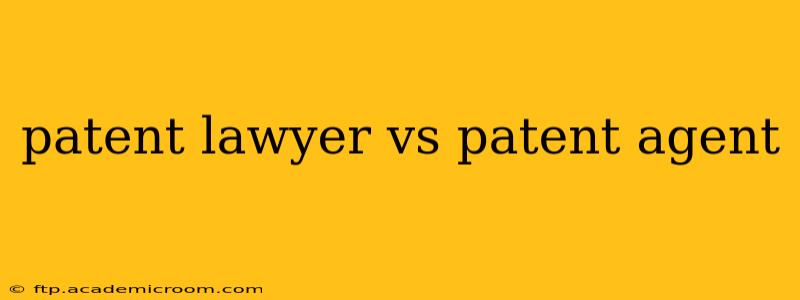Choosing between a patent lawyer and a patent agent can be crucial for protecting your intellectual property. Both are qualified to help you navigate the complex world of patents, but they possess distinct qualifications and limitations. Understanding their differences will empower you to make an informed decision tailored to your specific needs.
What is a Patent Lawyer?
A patent lawyer is a licensed attorney specializing in patent law. They hold a Juris Doctor (J.D.) degree from an accredited law school and have passed the bar exam in at least one state. This legal background allows them to represent clients in court, handle litigation related to patents, and advise on broader legal issues surrounding intellectual property, such as licensing agreements and trademarks. Their expertise extends beyond the technical aspects of patent applications to encompass the legal strategies and ramifications involved.
What is a Patent Agent?
A patent agent is a registered specialist with expertise in patent prosecution, but they are not attorneys. They possess a science or engineering background, usually a bachelor's or advanced degree, and have passed a rigorous examination administered by the United States Patent and Trademark Office (USPTO). Their deep technical understanding is invaluable in drafting and prosecuting patent applications. However, they cannot represent clients in court or offer legal advice outside the scope of patent prosecution.
Patent Lawyer vs. Patent Agent: A Detailed Comparison
Here's a table summarizing the key differences:
| Feature | Patent Lawyer | Patent Agent |
|---|---|---|
| Education | J.D. degree, passed bar exam | Science/Engineering degree, USPTO registration exam |
| Legal Authority | Can represent clients in court, offer legal advice | Cannot represent clients in court, limited legal advice |
| Expertise | Broad legal expertise, including patent law | Deep technical expertise in specific fields |
| Services | Patent prosecution, litigation, licensing, trademarks | Primarily patent prosecution, drafting, and filing |
| Cost | Generally more expensive | Generally less expensive |
What are the advantages of hiring a patent lawyer?
- Litigation: If you anticipate potential patent disputes or infringement lawsuits, a patent lawyer is essential. Their legal expertise is critical for navigating the complexities of legal proceedings.
- Broader Legal Advice: They can offer advice on various legal aspects related to your invention, beyond just the patent application process. This includes licensing agreements, intellectual property portfolio management, and contract negotiation.
- Strategic Planning: Patent lawyers can assist in developing a comprehensive IP strategy aligned with your business goals.
What are the advantages of hiring a patent agent?
- Technical Expertise: Their specialized technical background often provides a deeper understanding of complex technologies, enabling them to draft stronger patent applications.
- Cost-Effectiveness: For straightforward patent applications without anticipated litigation, a patent agent can be a more cost-effective option.
- Focus on Prosecution: They dedicate their expertise solely to patent prosecution, resulting in efficient and effective handling of the application process.
What type of invention needs a patent lawyer versus a patent agent?
This depends heavily on your needs and circumstances:
- High-Value Inventions with Potential Litigation: If your invention is highly valuable and you anticipate potential legal challenges, a patent lawyer is highly recommended.
- Simple Inventions with No Anticipated Litigation: For simpler inventions where patent prosecution is the primary concern and litigation is unlikely, a patent agent may suffice.
- Complex Technical Inventions Requiring Deep Scientific Understanding: A patent agent with expertise in the relevant technical field is invaluable for these inventions.
How much does a patent lawyer or agent cost?
The cost of hiring a patent lawyer or agent varies significantly depending on factors such as the complexity of the invention, the number of claims, and the attorney's experience and location. Expect to invest considerable funds. It's wise to obtain upfront cost estimates from several professionals before making a decision.
Can a patent agent handle international patent applications?
While patent agents can handle the initial USPTO filing, securing international patents often requires collaboration with foreign patent attorneys in the respective countries.
In conclusion:
The choice between a patent lawyer and a patent agent depends entirely on your specific needs and circumstances. Carefully consider the scope of your project, the potential for litigation, your budget, and the technical complexity of your invention to make an informed decision. Consulting with several professionals to discuss your situation and obtain quotes is strongly advised.
